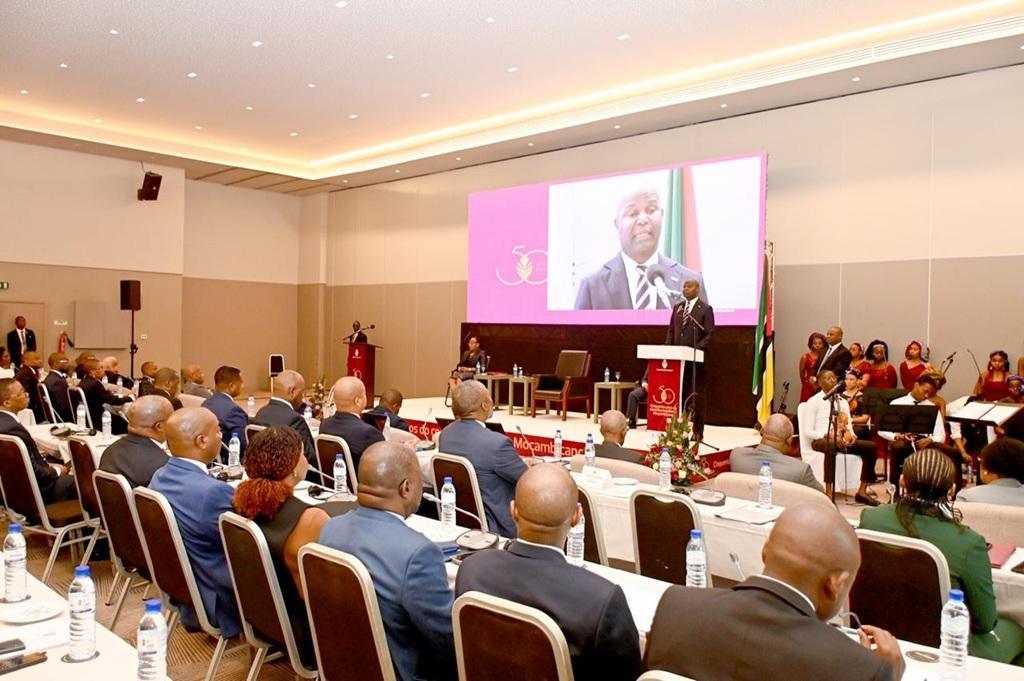Africa-Press – Mozambique. Mozambican President Daniel Chapo on Monday warned “we are living through times in which the challenges to the democratic rule of law are ever more complex and the risks to democracy ever more evident, not only in Mozambique, but in the region, in Africa and in the world”.
These threats, he said, meant that all Mozambicans are called upon to “make our contribution to implementing the law which approves the Political Commitment to Inclusive National Dialogue”. This “Political Commitment” is a document signed in March between Chapo and nine political parties.
Speaking at a seminar to mark the 50th anniversary of the adoption of the first Mozambican Constitution, on 20 June 1975, Chapo said one of the central aspects of the inclusive dialogue will be constitutional amendments.
These will include reforming the Mozambican state. Chapo stated explicitly that this means depoliticising state institutions – a term generally taken to mean separating political parties from the state.
The amendments should also deal with the powers of the President of the Republic, which opposition parties argue are far too broad. In particular, they object to the President’s power to appoint key figures in the judiciary, including the President of the Supreme Court and the Attorney-General.
The constitutional amendments should also deal with “political, economic and financial decentralisation and deconcentration”.
The election system must be reformed, stressed Chapo. This meant changing the composition of the electoral bodies “among other aspects that contribute to the integrity of elections, so that there are no more excuses that can lead people to violence”,
Currently, the National Elections Commission (CNE), and its executive body, the Electoral Administration Technical Secretariat (STAE) are dominated by political parties. Election commissions and STAE branches at all levels (central, provincial, district and city) are full of political appointees from the three parliamentary parties (the ruling Frelimo Party, and the opposition Renamo and MDM).
There are literally thousands of these appointees, ensuring that the entire system is unwieldy, expensive and deeply politicised.
Among the other changes Chapo wants to see are guaranteed access to the courts, with respect for the fundamental rights, freedoms and guarantees of citizens.
“The institutions that sustain our Republic, such as the Constitutional Council”, said the President, “should be strengthened and respected so that they comply with their noble mission, with independence, impartiality, responsibility, competence, integrity and technical rigour”.
Chapo pledged that he will do all in his power to ensure the independence of the judiciary, particularly its financial independence (judges have been protesting loudly in recent months that the courts are starved of funds).
He also pledged “total support” to the Constitutional Council and thanked its seven judges “for their dedicated work in support of Mozambican justice and democracy”.
However, the Council is another deeply politicised body, with five of its judges appointed by the parliamentary parties (four by Frelimo and one by Renamo). It was the Council’s refusal to order a recount after the October 2024 general elections, widely regarded as fraudulent, that precipitated the post-election violence and rioting, which led to around 300 deaths.
Chapo called for “open and constructive debates” projecting “the future we want to build for this Mozambique which belongs to all Mozambicans regardless of their political or religious affiliation, ethnic origin or anything else which makes us different”.
For More News And Analysis About Mozambique Follow Africa-Press






